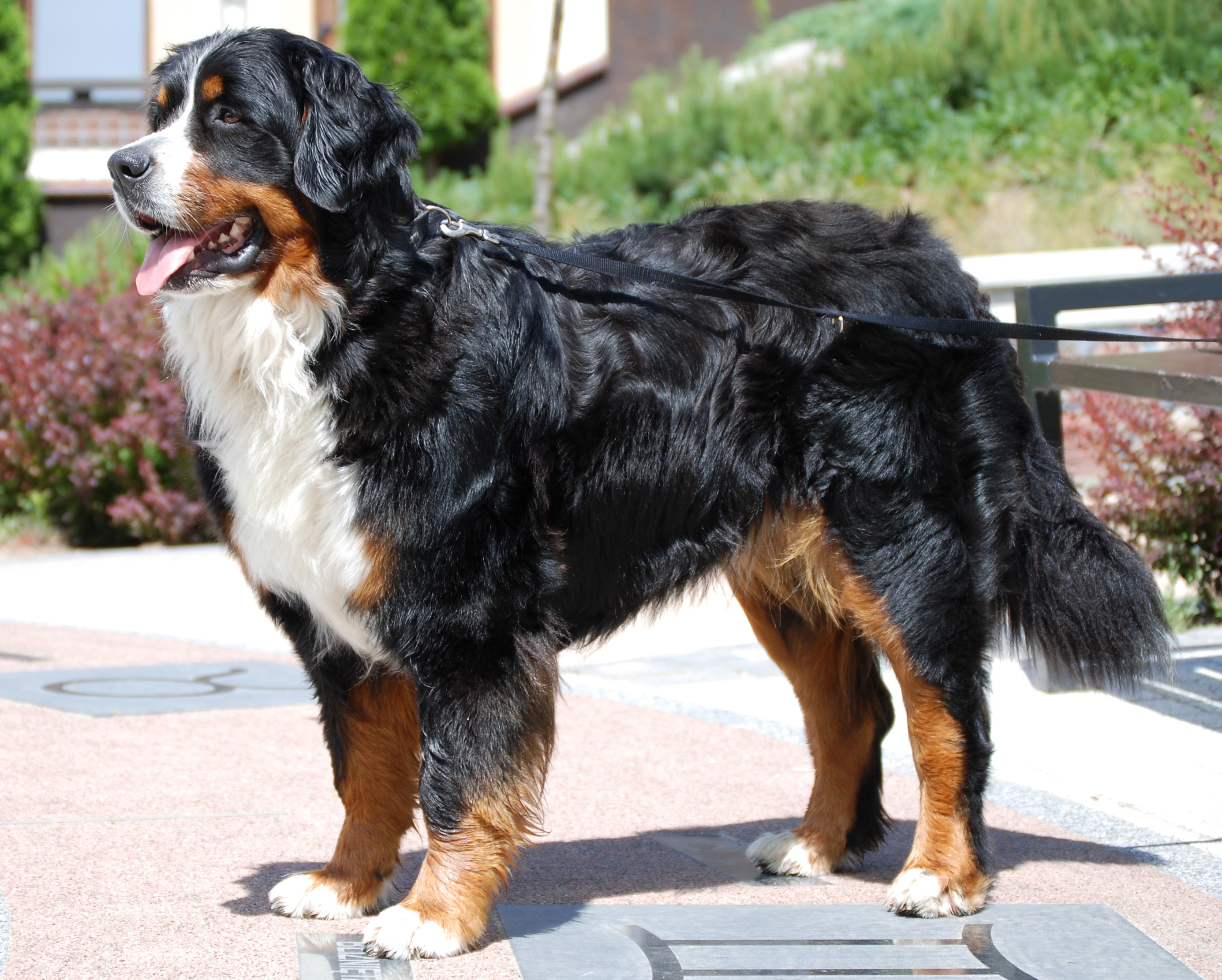The Red Bernese Mountain Dog is a stunning breed with a rich history. They originated in Switzerland as working dogs, assisting farmers with herding and guarding livestock.
Their thick coats come in a variety of colors, including the distinctive red hue that's a result of a genetic variation. This unique coloration is a result of a specific genetic combination that's not found in other Bernese Mountain Dogs.
Red Bernese Mountain Dogs are known for their intelligence and gentle nature, making them an excellent choice as family pets. They're highly trainable and thrive on human interaction.
These dogs are also prone to certain health issues, including hip dysplasia and cancer, which can be a concern for prospective owners.
At Home Care
A Red Bernese Mountain Dog needs a lot of space to move around, so you'll probably need a yard for her to run around in.
She requires a moderate amount of exercise, along with consistent training and socialization, to be happy and healthy. Regular walks and playtime are a must.
Her grooming is fairly straightforward, though you should be prepared for lots of loose fur and occasional strings of drool. Daily brushing is recommended during shedding season.
You'll need to supervise your pet as you would a toddler to keep her out of trouble and away from objects she shouldn’t put in her mouth. This includes keeping doors closed and picking up after yourself.
A weekly brushing is necessary to keep her coat looking its best, and daily brushing during shedding season. You can also brush her teeth at least twice a week to keep them perfect.
Clean her ears weekly, even as a puppy, to prevent infections. This is an important part of her regular care.
Here's a list of things to keep in mind when caring for your Red Bernese Mountain Dog's diet and exercise:
- Feed a high-quality diet appropriate for her age.
- Keep her diet consistent and don’t give her people food.
- Exercise your dog regularly, but don’t overdo it at first.
With regular care and attention, your Red Bernese Mountain Dog can live a happy and healthy life.
Their Temperament
The temperament of a Red Bernese Mountain Dog is truly something special. They are one of the more active giant breeds, but they are still fairly low-energy compared with most dogs.
Red Bernese Mountain Dogs are easy to train, which makes them a joy to have around. They are affectionate, demonstrative, and playful, and they are generally friendly toward strangers, other dogs, and other pets.
Their calm spirit and willingness to play make them brilliant companions for young children. They are known to be particularly gentle and affectionate with kids, and they may even take it upon themselves to watch over them.
While they can be intimidating watchdogs with a deep bark, they are not excessively barky dogs. They do have a strong desire to keep family members safe, which makes them excellent guard dogs.
Here are some key temperament traits of Red Bernese Mountain Dogs:
- Even-tempered and calm disposition
- Easy to train
- Excellent companions for young children
- Strong desire to keep family members safe
- Generally friendly toward strangers, other dogs, and other pets
Overall, the temperament of a Red Bernese Mountain Dog is a perfect blend of gentle, playful, and protective.
Health and Wellness
Red Bernese Mountain Dogs are prone to certain health issues that you should be aware of. Hip and elbow dysplasia are genetic abnormalities that can cause joint problems, and your vet can provide guidance on treatment.
These conditions can't be prevented, but being aware of them can help you take steps to manage them. Blood disorders, such as Von Willebrand's disease, can also affect this breed, causing the blood not to clot properly.
Cancer is a significant concern for Red Bernese Mountain Dogs, with histiocytic sarcoma being a common type. Symptoms can include lethargy, weight loss, and decreased appetite. Regular check-ups with your vet can help catch any potential issues early on.
Here are some common health concerns that affect Red Bernese Mountain Dogs:
- Hip and elbow dysplasia
- Blood disorders (e.g., Von Willebrand's disease)
- Cancer (e.g., histiocytic sarcoma)
- Progressive retinal atrophy
- Bloat
It's essential to work with a reputable breeder who has had their dogs tested for these conditions and can provide you with information on their medical history. Regular veterinary care, a balanced diet, and plenty of exercise can also help keep your Red Bernese Mountain Dog healthy and happy.
Common Health Problems

Bernese Mountain Dogs are beautiful and loyal companions, but like all breeds, they can be prone to certain health issues. Hip and elbow dysplasia are genetic abnormalities that can cause joint problems, and your vet can provide guidance on treatment.
Bernese Mountain Dogs are also at risk for blood disorders, including Von Willebrand's disease, which affects blood clotting. This can be a serious condition, so it's essential to monitor your dog's health closely.
Cancer is another common health issue in Bernese Mountain Dogs, with histiocytic sarcoma being a particularly aggressive form. Symptoms can include lethargy, weight loss, and decreased appetite.
Progressive retinal atrophy is a degenerative eye disease that can lead to blindness. This is a genetic condition, and there's no cure, but regular eye exams can help detect it early.
Bloat is a potentially life-threatening condition that occurs when the stomach twists, often due to eating too quickly. A surgery called gastroplexy can help prevent this.
You might enjoy: Bernese Mountain Dog Eye Problems
Here's a summary of the common health problems that can affect Bernese Mountain Dogs:
Allergies
Allergies can be a real nuisance for both humans and animals. In fact, Bernese dogs are prone to a skin allergy called atopy, which makes their skin itchy.
The symptoms of atopy typically start between the ages of one and three and can worsen every year. This means it's essential to keep an eye out for signs of atopy in your furry friend from an early age.
Common areas affected by atopy include the feet, belly, folds of the skin, and ears. If you notice your dog excessively licking their paws or rubbing their face, it could be a sign of atopy.
Frequent ear infections are another common sign of atopy in dogs. Regular veterinary check-ups can help catch these issues early on.
The good news is that there are many treatment options available for atopy, so don't hesitate to seek help if you suspect your dog is suffering from this condition.
Frequently Asked Questions
What colors do Bernese Mountain dogs come in?
Bernese Mountain Dogs come in two standard coat colors: tricolor with black, rust, and white, or black, tan, and white. Their distinctive markings make them a beloved breed.
What is a tri color Bernese Mountain Dog?
A tri-color Bernese Mountain Dog has a thick, silky coat featuring a combination of jet black, clear white, and rust colors. This distinctive tricolor pattern, along with its intelligent eyes, contributes to the breed's majestic and noble appearance.
Sources
- https://www.britannica.com/animal/Bernese-mountain-dog
- https://www.akc.org/expert-advice/lifestyle/fun-facts-bernese-mountain-dog/
- https://www.thesprucepets.com/bernese-mountain-dog-4427890
- https://www.countryliving.com/uk/wildlife/dog-breeds/a38765781/bernese-mountain-dog/
- https://parkwaysevierville.com/client-resources/breed-info/bernese-mountain-dog/
Featured Images: pexels.com


